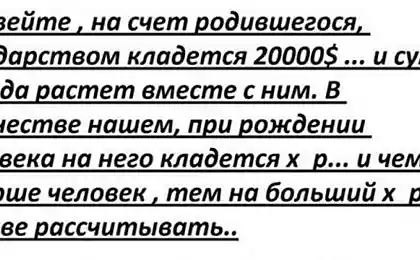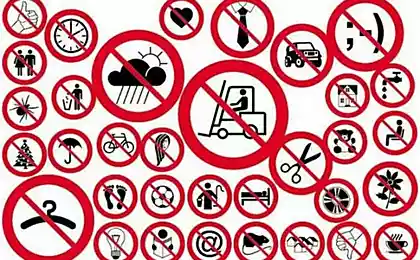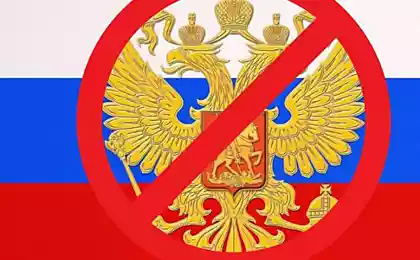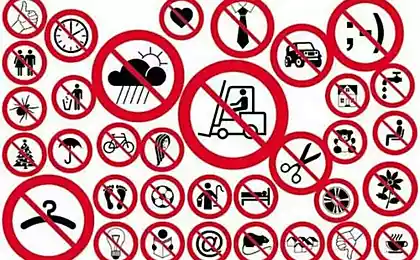964
Why not smile Russian 7 facts about our smile
The first thing that surprises the foreign tourist in Russia, - the number of gloomy people. Why Russian so little smile? Famous scientists lingvistyI. A. Sternin and Prokhorov YE identified several Russian national characteristics smiles. The site offers to familiarize with their interesting observations. 1. Russian smile differently than other people h3> Russian smile (normally) performed only the lips, occasionally becomes slightly visible upper row of teeth; demonstration at a smile upper and lower teeth, as do the Americans, according to the Russian culture, unpleasant, vulgar, such as a smile or a grin called "horse».
2. The smile in Russian communication is not a signal of courtesy h3> For most Americans and Western Europeans smile - especially a signal of courtesy, so it is obligatory under the greeting, and in the course of small talk.
3. The Russian communication is not accepted strangers smile h3> The smile in Russian communication is addressed most familiar. That's why buyers saleswomen do not smile - they do not know them. If Russian man smiled a stranger, it is likely to encourage the Russian search for the reason he addressed a smile and cause the question: "But we know each other?»
4. In Russian it is not accepted to smile in office h3> It has long been stewards, servants, waiters were polite, but never allowed himself to smile. Old tradition alive today. A friendly smile barely survives in Russian service, as the people of our mentality of such "professional" smile mask seems artificial, false guise that conceals indifference.
5. Russian smile is intended to only be sincere and to have clear reasons h3> The Chinese say: "At the heart of the offense, and the smile on his face." Russian is excessive smiling and cheerfulness for no apparent reason seems suspicious. Such a smile can be seen as stupid, or in the worst case as the challenging behavior (for men) or a sign inviting (for women). Therefore it says, "Laughter without reason - sign fool».
6. The smile should be appropriate h3> Russian important that smile was in place and corresponded to the situation. Russian proverb says: Cause time fun hour. Teachers often make comments to children: "Then you will smile, work." Not accepted to smile, if there are people who are known, they have serious afflictions: someone is sick, concerned about personal problems and so on. D. - "Not to smile».
7. Smile and laugh - it's not the same thing h3> Despite the fact that the smile is alien to Russian, linguists note that still the majority of Russian people are cheerful, hospitable, cheerful and witty. Smile and laugh - it's not the same thing, and, according to the researchers, it is inherent in Russian laughter, though sometimes it is the same "laughter through tears" about which Gogol wrote.
1. Russian smile differently than other people h3> Russian smile (normally) performed only the lips, occasionally becomes slightly visible upper row of teeth; demonstration at a smile upper and lower teeth, as do the Americans, according to the Russian culture, unpleasant, vulgar, such as a smile or a grin called "horse».
2. The smile in Russian communication is not a signal of courtesy h3> For most Americans and Western Europeans smile - especially a signal of courtesy, so it is obligatory under the greeting, and in the course of small talk.
Russian smile out of politeness is not peculiar, in fact, often perceived hostile. Russian phrase "he smiled out of politeness" contains disapproval of a smile. The polite smile for the customers also disapprove what we call "duty" and is considered to be a manifestation of insincerity.
3. The Russian communication is not accepted strangers smile h3> The smile in Russian communication is addressed most familiar. That's why buyers saleswomen do not smile - they do not know them. If Russian man smiled a stranger, it is likely to encourage the Russian search for the reason he addressed a smile and cause the question: "But we know each other?»
In case of accidental eye meeting Americans smile, while the Russian made, on the contrary, to look away.

4. In Russian it is not accepted to smile in office h3> It has long been stewards, servants, waiters were polite, but never allowed himself to smile. Old tradition alive today. A friendly smile barely survives in Russian service, as the people of our mentality of such "professional" smile mask seems artificial, false guise that conceals indifference.
5. Russian smile is intended to only be sincere and to have clear reasons h3> The Chinese say: "At the heart of the offense, and the smile on his face." Russian is excessive smiling and cheerfulness for no apparent reason seems suspicious. Such a smile can be seen as stupid, or in the worst case as the challenging behavior (for men) or a sign inviting (for women). Therefore it says, "Laughter without reason - sign fool».
6. The smile should be appropriate h3> Russian important that smile was in place and corresponded to the situation. Russian proverb says: Cause time fun hour. Teachers often make comments to children: "Then you will smile, work." Not accepted to smile, if there are people who are known, they have serious afflictions: someone is sick, concerned about personal problems and so on. D. - "Not to smile».
7. Smile and laugh - it's not the same thing h3> Despite the fact that the smile is alien to Russian, linguists note that still the majority of Russian people are cheerful, hospitable, cheerful and witty. Smile and laugh - it's not the same thing, and, according to the researchers, it is inherent in Russian laughter, though sometimes it is the same "laughter through tears" about which Gogol wrote.
via www.moya-planeta.ru/travel/view/pochemu_russkie_ne_ulybajutsya_9789/
11 ways in which our consciousness shamelessly fooling ourselves
10 interesting facts about the movie "Robocop", the one in 1987
























